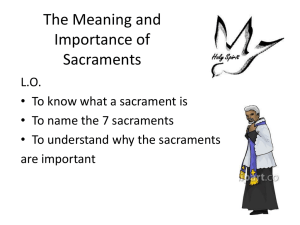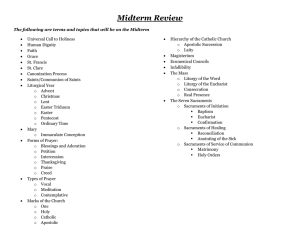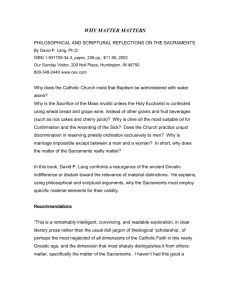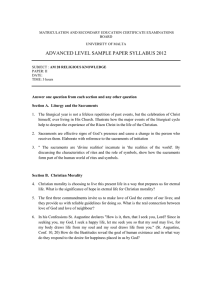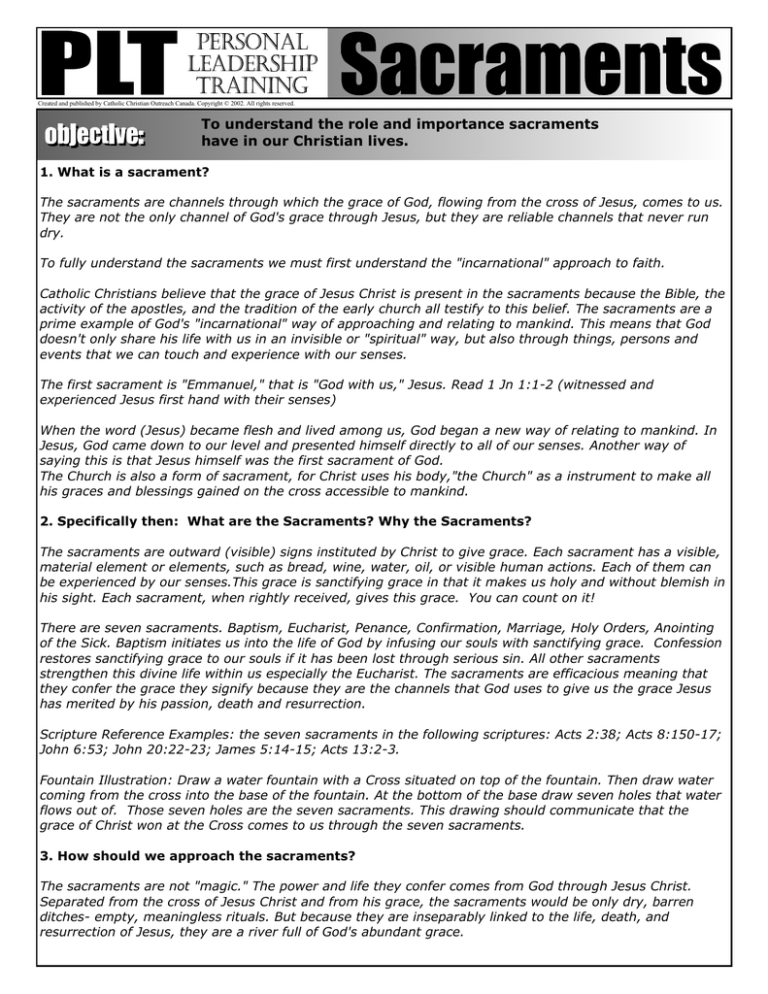
Created and published by Catholic Christian Outreach Canada. Copyright © 2002. All rights reserved.
To understand the role and importance sacraments
have in our Christian lives.
1. What is a sacrament?
The sacraments are channels through which the grace of God, flowing from the cross of Jesus, comes to us.
They are not the only channel of God's grace through Jesus, but they are reliable channels that never run
dry.
To fully understand the sacraments we must first understand the "incarnational" approach to faith.
Catholic Christians believe that the grace of Jesus Christ is present in the sacraments because the Bible, the
activity of the apostles, and the tradition of the early church all testify to this belief. The sacraments are a
prime example of God's "incarnational" way of approaching and relating to mankind. This means that God
doesn't only share his life with us in an invisible or "spiritual" way, but also through things, persons and
events that we can touch and experience with our senses.
The first sacrament is "Emmanuel," that is "God with us," Jesus. Read 1 Jn 1:1-2 (witnessed and
experienced Jesus first hand with their senses)
When the word (Jesus) became flesh and lived among us, God began a new way of relating to mankind. In
Jesus, God came down to our level and presented himself directly to all of our senses. Another way of
saying this is that Jesus himself was the first sacrament of God.
The Church is also a form of sacrament, for Christ uses his body,"the Church" as a instrument to make all
his graces and blessings gained on the cross accessible to mankind.
2. Specifically then: What are the Sacraments? Why the Sacraments?
The sacraments are outward (visible) signs instituted by Christ to give grace. Each sacrament has a visible,
material element or elements, such as bread, wine, water, oil, or visible human actions. Each of them can
be experienced by our senses.This grace is sanctifying grace in that it makes us holy and without blemish in
his sight. Each sacrament, when rightly received, gives this grace. You can count on it!
There are seven sacraments. Baptism, Eucharist, Penance, Confirmation, Marriage, Holy Orders, Anointing
of the Sick. Baptism initiates us into the life of God by infusing our souls with sanctifying grace. Confession
restores sanctifying grace to our souls if it has been lost through serious sin. All other sacraments
strengthen this divine life within us especially the Eucharist. The sacraments are efficacious meaning that
they confer the grace they signify because they are the channels that God uses to give us the grace Jesus
has merited by his passion, death and resurrection.
Scripture Reference Examples: the seven sacraments in the following scriptures: Acts 2:38; Acts 8:150-17;
John 6:53; John 20:22-23; James 5:14-15; Acts 13:2-3.
Fountain Illustration: Draw a water fountain with a Cross situated on top of the fountain. Then draw water
coming from the cross into the base of the fountain. At the bottom of the base draw seven holes that water
flows out of. Those seven holes are the seven sacraments. This drawing should communicate that the
grace of Christ won at the Cross comes to us through the seven sacraments.
3. How should we approach the sacraments?
The sacraments are not "magic." The power and life they confer comes from God through Jesus Christ.
Separated from the cross of Jesus Christ and from his grace, the sacraments would be only dry, barren
ditches- empty, meaningless rituals. But because they are inseparably linked to the life, death, and
resurrection of Jesus, they are a river full of God's abundant grace.
We receive the benefits of the grace and salvation that Jesus won for us by simply coming to Him. We must
"come to Him"....One way of coming to Jesus is through the sacraments. We must participate in the
sacraments not merely externally, but with real faith and expectancy that God himself is present and
wishes to act in our lives through them.
4. What does the term “Sacramental Economy of Salvation” mean?
“In this age of the Church, Christ now lives and acts in and with his Church.... He acts through the
sacraments in what the common Tradition of the East and West calls the “sacramental economy”; this is the
communication or dispensation of the fruits of Christ’s Paschal mystery ...” (CCC#1076).
In Layman’s language: Christ has chosen to institute the sacraments as the means by which we receive and
participate in his saving and sanctifying work. The power of the cross comes to us through the channels of
the sacraments.
5. Why are the Sacraments necessary for salvation?
Yes, they are. “The Church affirms that for believers the sacraments of the New Covenant are necessary for
salvation.” (CCC#1129). We must keep in mind what St. Augustine said, “We are bound by the
sacraments, God is not.” God has revealed the necessity of the sacraments. We have the privilege and the
responsibility to respond to his revealed desire. Indeed, the sacramental economy is the “ordinary path” of
working out one’s salvation, but God can work outside the sacraments. We must pray for all to fully united
with Christ.
Pray for increased faith and expectancy from your
participation in the sacraments.

